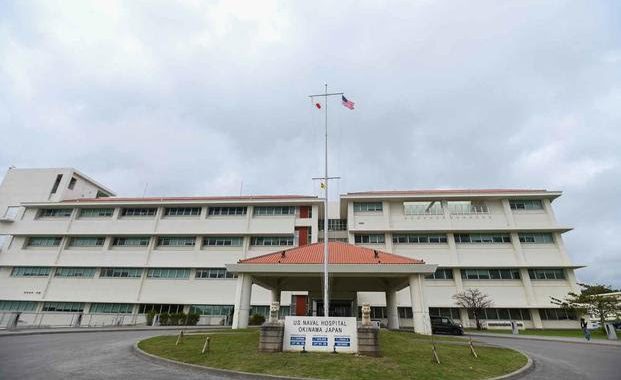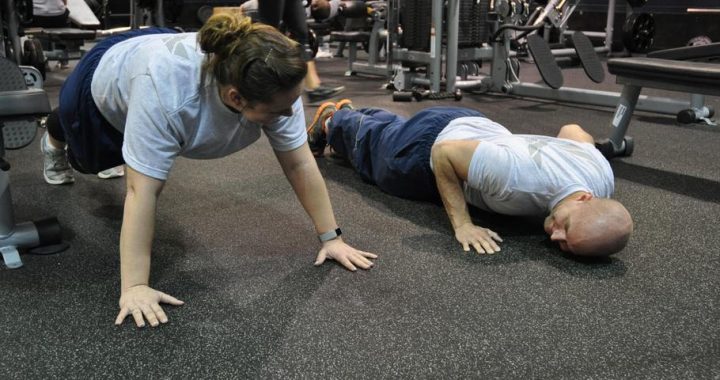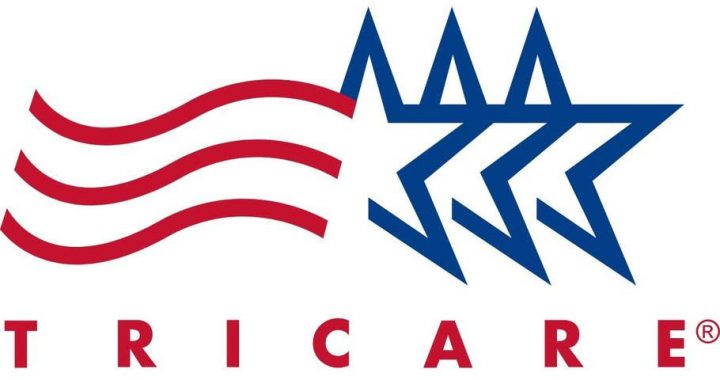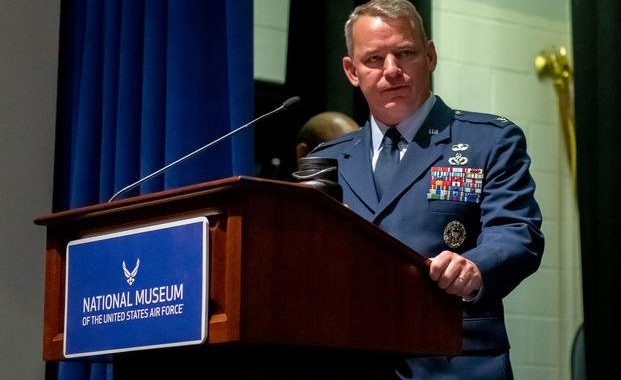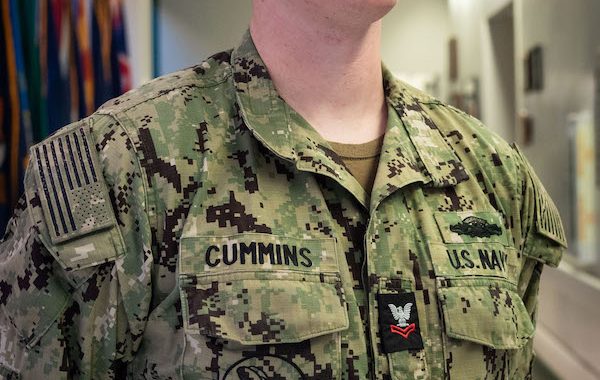Breast Cancer Awareness Month: Employee Shares Her Journey Through Treatment, Recovery
7 min read
FORT BELVOIR, VA, UNITED STATES
Story by Beth Reece
Defense Logistics Agency
Christmas Day, 2016. I wake belly down, face squished against the pillow. Pain shoots through my left breast and I roll over, wondering when I last did a self-exam. All the suspicion I’d be the first woman in my family … it can’t be true. The mammogram I had in May was clean, but my fingers tremble as they press into a hard, pea-sized knot. What unlucky soul finds a lump on her breast on Christmas Day?
Me, I am that woman.
I am numb with panic. My doctor’s office is closed for the holiday. Our car is packed for the five-hour drive to my parents’ home in West Virginia. So I do what any wife and daughter who doesn’t want to worry her loved ones would do: I bury it. Open a bottle of red. Bask in denial.
Christmas passes and New Year’s Eve comes. People everywhere bid good riddance to the old and usher in a shiny, new year, full of hope. I have nothing but fear for what cancer might do to me in 2017. As others shuffle back to work and their routines, I sit in a waiting room reeling off Hail Marys after an ultrasound exposes a dark mass my doctor wants to biopsy immediately. The results are benign, but it’s such a stark contrast to imaging I’m scheduled for surgery the following week.
“It’s the only way to know for sure if you have cancer,” the doctor says. “Try not to worry.”
I think of nothing else. “Dr. Google” tells me 80% of breast lumps are benign. Though the odds are clearly in my favor, my glass-half-empty mind zeros in on the malignant 20%. I feign a sense of calm for my husband, Paul, but after he kisses me goodnight, tears and desperation erupt under the covers.
Why me? God, please don’t let me die. I am only 46.
Two days later, I join the club of one in eight American women who get breast cancer.
“It’s aggressive,” the surgeon says.
***
Valentine’s Day 2017. Paul and I celebrate our love on an oncology ward. The nurses have ushered me into a recliner with a heated blanket, apple juice and saltines. Will chemo hurt? Will I vomit? Faint? The questions fade when I count nine other patients resting, their noses in books or fingers pecking away at cellphones. None of them are writhing in pain or hovering over a vomit bag. All but one have hair.
By the second bag of Benadryl, given to ward off an allergic reaction to the chemotherapy, my eyes are heavy and worries subdued. I am putty. The nurse holds up a bag of clear fluid and asks me to confirm the name and birthdate on the label is mine. The drug is so toxic she wears a protective gown and gloves to administer it. Paul caresses my hand, consoling me although he, too, is alarmed. The only sign of the drug pulsing through my veins is its steady drip, drip, drip into the catheter. I feel nothing.
Later, the music startles us all. Four white-haired men in tuxedos, a barbershop quartet, stroll in with a song, serenading us as if the reason we are all gathered here is a happy one. They want us to feel normal on this lovers’ holiday, and maybe some of us do, despite nurses dashing from chair to chair hooking up fresh bags of poison to the alarms of empty IV pumps.
Paul and I leave six hours later, both of us wondering when the changes will begin.
***
It takes 24 hours for the side effects to pummel by body. Nausea. Diarrhea. Chills. Every muscle, every joint, throbs. A rash from my chest to my chin. Electric shock-like stabs to the bottom of my feet. Fatigue so thick I can barely lift myself from bed. The tips of my fingers are too tender to peel the wrapper from a ginger chew or flip open the lid on my shower gel. My tongue is dry like cotton, my mouth metallic and putrid. Six pounds of retained fluid bloat my legs. My eyes tear up and eyelids twitch.
My body is at war with itself and all I can do is wait for a truce. Paul sits alone on the couch watching as I waste away on the loveseat, shivering under a pile of blankets. He brings me chicken noodle soup, the only thing I can stomach besides plain toast. At night, he sleeps in the guest room so I can spread my limbs across our bed in misery.
This hell drags on for four long days before I have the strength to resurface.
Then 1,000 tiny, invisible needles prick my scalp, and I know it’s time: shave off my hair or lose it clump by clump. The baldness in the mirror doesn’t bother me. Guessing what people at work will say does. When I go back to covering news events, there will be people who haven’t seen me since Christmas. The hat is all they’ll see; they’ll instantly know. Some will stare and a few will probably ask if I’m OK. I am not. I’m frightened that treatment might not be doing its job. I’m tired of thinking about it. I definitely don’t want to talk about it. God, what is my future? Do I have one?
In the end, I buy a wig. Co-workers admire it and return my fake smiles as I struggle to overcome chemo brain and write logical sentences again. Normalcy is in sight, just in time for Chemo, Round Two. And so it goes for the next four months.
***
My doctor suggested genetic testing early in my diagnosis. I agreed because I longed for the answer to my “Why?” The conclusion: “Your genetic test results can’t provide an explanation for your family history or your own diagnosis of breast cancer.” Like most people, I wrongly believed my genes had the most say in whether I got cancer. According to cancer.org, only about 5-10% of all cancers result directly from gene defects inherited from a parent. If I can get breast cancer due to rotten luck, so can my mom, my sisters. You. But I believe we create our own luck, so it must’ve been something I did. Night after night, through the last rounds of chemo and five weeks of radiation, I scanned the internet for answers. The birth control pills I’d been on since I was 19 increased my risk of cancer. Not having children even more so. The parabens and other dangerous ingredients in the cosmetics I loved were all known to be hormone disruptors. Same with the plastic containers I microwaved my breakfast and lunch in at work. The 20 extra pounds of fluff on my thighs and my I’ll-do-it-tomorrow exercise routine further upped my risks. On top of it all was my nightly wine addiction.
The message I got was strong: My choices mattered. Reconciling the possibility of death with my yearning to live, I chose to let some things go. I gave myself two months to quit meat, dairy, sugar, oil and processed foods. I learned to recognize iffy ingredients on beauty product labels, replaced all our plastic with glass, switched to organic produce and vowed to walk at least 30 minutes a day. I gave up wine. Some people called my choices “extreme.” One told me I’d let cancer win.
***
October 2019. They call me a survivor. My blonde hair and eyelashes have grown back darker, thinner. My youth has dissolved with chemo-induced menopause. It took more than a year, but I’ve learned to stop clinging to the woman I once was, that naïve girl unmarked by cancer and its lingering scars.
That woman is gone. In her place is a daughter and sister who hopes the other women in her family are safe. I worry for them as they find lumps of their own, all benign so far. They’ve been spared, but the numbers – one in eight women – are real to me now. I hope my year of agony scared them into regular self-exams. And I wonder if the exam I did in bed in the early Christmas morning hours in 2016 saved my life. How far would my aggressive type of cancer have spread in the five months I would’ve otherwise waited for the next routine mammogram?
When the questions raid my mind – Will it come back? Will it kill me? – I send them away unanswered, because the joy of living douses my fear of dying. God can and has brought good from my suffering, for he has drawn me closer. My faith overshadows grief. And I understand this: No matter what I do to protect myself, I can’t override God’s will. I’ve discovered that as long as I lean on him, trust him, tomorrow can bring what it may. For now, I’ll harness my newfound strength and let go of regret over what I’ve endured. I can’t change the past or predict the future, but I can embrace today. I can remind others: Get a mammogram, and please know your breasts by doing regular self-exams. Early detection saves lives.
Editor’s note: This story was originally published at https://www.dla.mil/DesktopModules/ArticleCS/Print.aspx?PortalId=104&ModuleId=47704&Article=1991329 Oct. 24, 2019.


